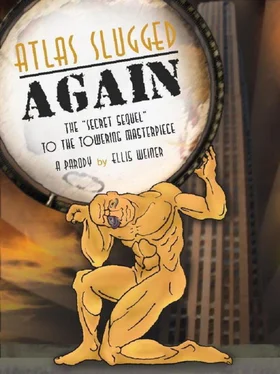Ellis Weiner - Atlas Slugged AGAIN - The Secret Sequel to the Towering Masterpiece
Здесь есть возможность читать онлайн «Ellis Weiner - Atlas Slugged AGAIN - The Secret Sequel to the Towering Masterpiece» весь текст электронной книги совершенно бесплатно (целиком полную версию без сокращений). В некоторых случаях можно слушать аудио, скачать через торрент в формате fb2 и присутствует краткое содержание. Год выпуска: 2015, Жанр: humor_satire, на английском языке. Описание произведения, (предисловие) а так же отзывы посетителей доступны на портале библиотеки ЛибКат.
- Название:Atlas Slugged AGAIN: The Secret Sequel to the Towering Masterpiece
- Автор:
- Жанр:
- Год:2015
- ISBN:нет данных
- Рейтинг книги:3 / 5. Голосов: 1
-
Избранное:Добавить в избранное
- Отзывы:
-
Ваша оценка:
- 60
- 1
- 2
- 3
- 4
- 5
Atlas Slugged AGAIN: The Secret Sequel to the Towering Masterpiece: краткое содержание, описание и аннотация
Предлагаем к чтению аннотацию, описание, краткое содержание или предисловие (зависит от того, что написал сам автор книги «Atlas Slugged AGAIN: The Secret Sequel to the Towering Masterpiece»). Если вы не нашли необходимую информацию о книге — напишите в комментариях, мы постараемся отыскать её.
Atlas Slugged AGAIN: The Secret Sequel to the Towering Masterpiece — читать онлайн бесплатно полную книгу (весь текст) целиком
Ниже представлен текст книги, разбитый по страницам. Система сохранения места последней прочитанной страницы, позволяет с удобством читать онлайн бесплатно книгу «Atlas Slugged AGAIN: The Secret Sequel to the Towering Masterpiece», без необходимости каждый раз заново искать на чём Вы остановились. Поставьте закладку, и сможете в любой момент перейти на страницу, на которой закончили чтение.
Интервал:
Закладка:
Glatt shifted his gaze over each of them. “All right,” he said.
Chapter 6
The Strike
The train, dubbed by the press boys “The Tagbord Special,” raced through the evening twilight past lonely farms and smug towns and stoic road crossings like a living thing intent on attaining the destination that would fulfill its highest purpose. Its passenger manifest contained only two names: Miss Dragnie Tagbord, and Mr. Nathan A. Banden.
Its destination this night was Chicago, where Dragnie was scheduled the next day to attend a meeting of the openly racist National Association for the Abolition of Colored People in the morning and, that evening, a rally for the Student Violent Coordinating Committee. Each organization was barely two weeks old. Each was the consequence of a new ruling passed summarily into law by John Glatt’s Strike Committee. “To deny the world the America of its dreams,” he had proclaimed, “We will pull off a switch-back and un-do America.” The first new law, known as the Pro-Be Nasty to People You Don’t Like Act, made it a crime to prevent, inhibit, or protest expressions of disapproval or enmity about any racial or religious group or organization. “The very word ‘tolerance’ is patronizing and insulting,’ announced Communique No. 2 as issued by the Strike Committee. “If Americans cannot be free to hate whomever they want, then they cannot be free in anything.” The result was an immediate proliferation of openly racist and religiously bigoted op-ed columns, hate groups, publications, tracts, speeches, pageants, parades, Off-Broadway musicals, and half-time shows. This drew the predictable criticisms from individuals and groups for whom “brotherly love” was the highest form of man’s achievement—the same groups, many noted, whose sympathies lay more with the empty abstraction of “humanity” than with the actual American people. “With this ruling encouraging bigotry and hate, America has betrayed her proud heritage and taken a large step back toward the Dark Ages,” announced the Prime Minister of the People’s State of the People of Great Britain, a short, sweaty man with perennially unkempt fingernails. It was noticed, however, that applications for immigration to the U.S. from Muslim, Latin American, African, and Asian countries dropped by 68%.
Dragnie was seated in the office car, putting the finishing touches on her speech, when Banden entered. “We’re pulling into Centerville to take on water,” he said. “Care to stretch your legs?”
She smiled with a hint of a smile. She did not mention the familiarity he had acquired with her legs. She did not feel it necessary to remind him that they would be sharing her executive car that night, as they had every night since the journey began. “Yes,” she said.
They walked across the platform, her practiced eye noting with satisfaction its state of decay and disrepair. Her reaction was the same to the ill-lit, trash-strewn terminal. Outside its doors, the main street of Centerville gave similar evidence of neglect and lack of upkeep. Pot holes in the street, vandalized signs, garbage festering in alleys and clogging sewer drains all offered proof that, in the ten years since the elimination of state and local taxes, what some intellectuals attempted to glorify as “the public sphere” had, in accordance with John Glatt’s Fifteen Year Plan, been allowed to rot into a nutrient-rich mulch to be used to fertilize the private sector. Private property, embodiments of the highest achievement of civilization, flourished: store fronts, office buildings, and private residences all looked new, and all displayed the logo of a corporation called Centervillecorp.
“You… you’re Dragnie Tagbord, aren’t you?”
The question, which carried with it an undertone of surprised pleasure, had come from a bum loitering nearby. His greasy coat was shabby and threadbare; he had not shaved in weeks. The weathered, soiled state of his face made his age unreadable. He could have been twenty-five or three times that. Banden gently grasped Dragnie’s arm as though to guide her away from what he perceived as possible danger, but she met the bum’s gaze and said, “Yes.”
“Well, ma’am, I just want to thank you.”
Dragnie chuckled with a chuckle. “Thank me? For what?”
The bum gestured broadly, indicating the entire main street. “For this. I was against it, at first. You see, Miss Tagbord, I used to be a professor of political science. Oh, my name is of no importance. What matters is that I used to feel that society had an obligation to attend to the public, social aspect of man’s nature. I used to think that that’s what society was , a way to reconcile private desires and needs with public needs and amenities. And so when John Glatt and his colleagues took over the country ten years ago, I feared the worst. I thought their radical form of individualism would do nothing more than serve a narrow constituency of private interests at the expense of the vast majority of the American people, that a philosophy lionizing ‘producers’ was merely a self-serving bit of cant to advance the interests of the wealthy. But over ten years of such policies I’ve realized my error. As every public institution, from the Federal government down to the local street-cleaning crew, was denied funding or eliminated altogether, I realized how fragile and weak a creature government is. Government can be hobbled or eviscerated by the actions of any ignorant mob. All that’s required is for the stupid, the frightened, the resentful, the credulous, and the desperate to vote in candidates whose interest in working in government consists in wanting to cripple it. Government is therefore like a servant, who must do what his master tells him, and if his master is a fool, so much the worse for him. Whereas corporations are like heroes! Or, really, super-heroes, such as those adolescents read about in lurid comic book periodicals. The powers and resources of super-heroes dwarf those of mere men. Why, then, would a society wish to be ruled by individuals elected by idiots, when it could be guided by experts and demi-gods? Granted, we have filthy streets. The state university I worked for has gone out of business. Our local privatized fire department has just raised its rates again. A flu shot costs an average week’s wages. Criminal gangs of disaffected youth, led by unscrupulous professional crime lords, rule the night. But in exchange for that, we have our individual freedoms guarded by a Superman, who grows more powerful and invincible each day. As you can see, Centervillecorp has taken over every business in town, including nail salons and the ice cream shop. Imagine its power, its scale, its scope! And now, with the new anti-anti-trust laws being promulgated by your husband, it will be capable of even more! Business will at long last be free of the lingering restrictions and inhibitions still left over from the old we-know-best, eat-your-peas, play-fair-or-go-to-your-room nanny state. Successful companies will at last be free to acquire less successful companies, with the large subsuming the small until each industry will be free to be dominated by one or two hyper-efficient behemoths. The resulting layoffs will not only tarnish the image of the U.S. in the eyes of the rest of the world, but will also free millions of American citizens, who were previously employed by pre-existing companies, to start their own corporations—to compete with the giants, to be swallowed up by them, and so make them even mightier and more magnificent. So thanks, Miss Tagbord, both to you and to your visionary, heroic husband.”
“We’re not married.”
“Boyfriend, then.”
“You’re welcome,” Dragnie said.
“One question, fellow,” Banden said. “What do you live on?”
Читать дальшеИнтервал:
Закладка:
Похожие книги на «Atlas Slugged AGAIN: The Secret Sequel to the Towering Masterpiece»
Представляем Вашему вниманию похожие книги на «Atlas Slugged AGAIN: The Secret Sequel to the Towering Masterpiece» списком для выбора. Мы отобрали схожую по названию и смыслу литературу в надежде предоставить читателям больше вариантов отыскать новые, интересные, ещё непрочитанные произведения.
Обсуждение, отзывы о книге «Atlas Slugged AGAIN: The Secret Sequel to the Towering Masterpiece» и просто собственные мнения читателей. Оставьте ваши комментарии, напишите, что Вы думаете о произведении, его смысле или главных героях. Укажите что конкретно понравилось, а что нет, и почему Вы так считаете.












